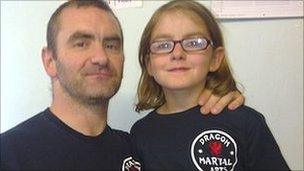Gwynedd family back charter for young diabetics
- Published

Eric Williams says there needs to be more support for diabetic children like his daughter, Anna, nine
The family of a young diabetic patient from Gwynedd are backing a new children's charter for the condition.
Diabetes UK is warning that some youngsters with the illness are experiencing bullying, discrimination and isolation.
Eric Williams, from Blaenau Ffestiniog, said he knew nothing about diabetes when his daughter Anna, nine, was diagnosed when she was three.
The charity is urging people to sign a petition backing the charter.
Dai Williams, national director for Diabetes UK Cymru, said: "It is unacceptable that some children are made to feel different and isolated and there is a lot of misunderstanding and ignorance that can lead to bullying or discrimination.
"The emotional impact of diabetes on children's wellbeing is a very serious issue and it can influence how well they manage their diabetes.
"Without proper management diabetes can lead to serious health complications in the future, such as blindness, heart disease, stroke, kidney disease and amputation."
Launching itsLaunching its children's charter, external, the charity said one of the main focuses was emotional wellbeing.
It said 87% of the young people it had spoken to as it drew up the charter had never seen a psychologist.
The charity said that this was despite the best current clinical guidelines recognising that young people with diabetes are vulnerable to emotional problems.
Insulin injections
There are 1,400 youngsters in Wales diagnosed with type-1 diabetes, including Eric Williams's daughter Anna, who relies on insulin injections to keep her alive.
"I felt a little bit sad as I had to stay in hospital for a while," she said as she recalled the first days following the diagnosis.
"It was a bit scary, but I felt a little bit happy too as my auntie and uncle bought me presents.
"Now I find diabetes a bit hard but I am getting used to it.
"When I go to school my friends have lots of things in their lunch box like crisps and sometimes I want some but I can't always have it. It can make me feel left out.
"Sometimes when I am at school and my blood levels are low my friends say I am supposed to run when I'm meant to sit down. It can be hard explaining."
Mr Williams, 40, who runs martial arts classes, would like more support for families and children at diagnosis.
He said: "When she was diagnosed I felt that there was no light at the end of the tunnel.
Deep end'
"We didn't know what was going on and we knew nothing about diabetes and the symptoms.
"It was like we were thrown into the deep end with concrete boots on and didn't know how to swim. I kept thinking 'This is it for the rest of her life'.
"I asked the doctor if he could take my pancreas for her but he told me it didn't work like that.
"As a parent you want to do your best for your kids and I felt a sense of helplessness that I couldn't do anything."
- Published16 June 2010